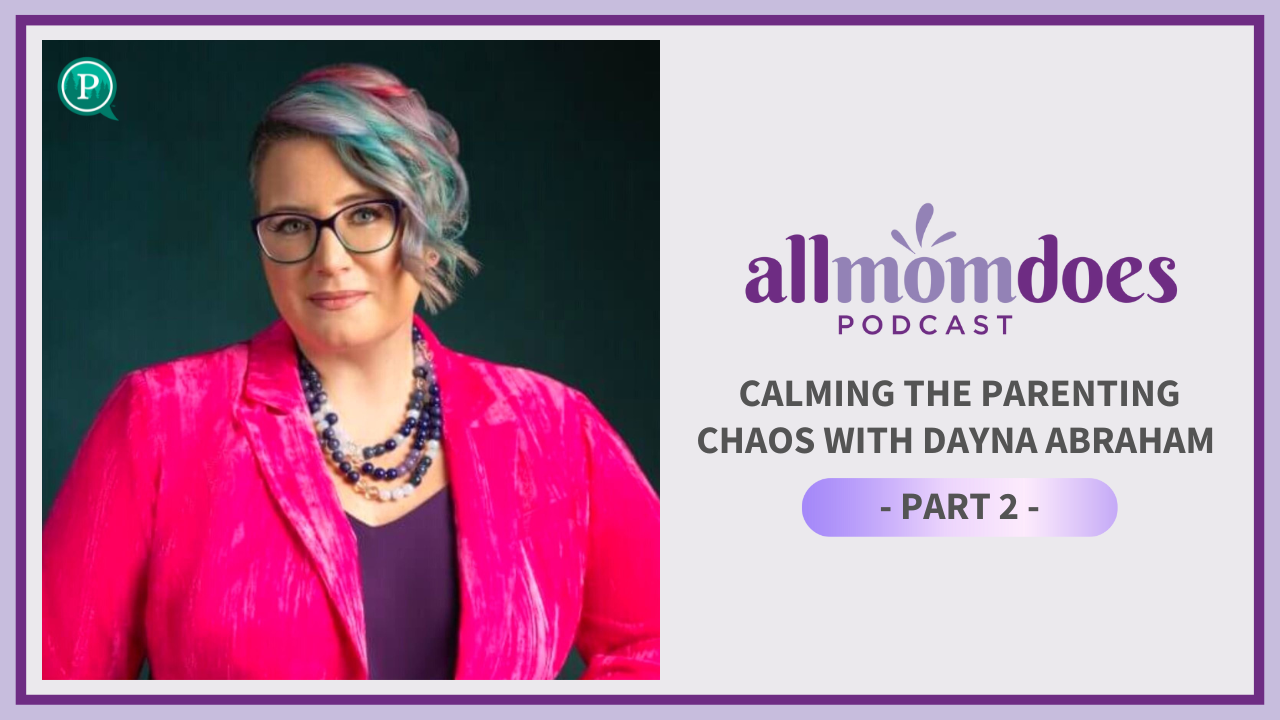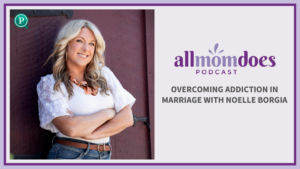In Part 2 of our interview with parenting expert Dayna Abraham, we’ll talk about how to get on page with your spouse about parenting approaches, why we all will have times we’ll blow it in the parenting arena and what to do next, and how to remain both consistent and flexible when it comes to dealing with our kids in this two-part episode on the AllMomDoes podcast with Julie Lyles Carr.
Show Notes:
Find Dayna: Online | Instagram | Facebook
- Book: Calm the Chaos
Find Julie: Online | Instagram | Facebook | Twitter | Pinterest
AllMomDoes | Instagram | Facebook | Twitter
Transcription:
Julie:
One of my children had a stroke at birth, she has cerebral palsy, and we went through a period of time that when she was growing up and she was doing different things and we were in a lot of PT, what was interesting is even though we were working on physical, the way the brain was rewiring around some of that latent effect from the stroke would just trip her into all kinds of emotions.
And I confess upright, Dayna, there were times that I did not handle it well at all, because she would freak out. And me trying to get her calmer, trying to understand, I would find myself starting to freak out and then everybody would be a mess. And I’m sure I did not handle … she’ll be unpacking that, I’m sure, with some counseling later on about how mom reacted.
Dayna:
I really think you can be the best parent in the world and your kid is still going to go to therapy.
Julie:
Yeah, exactly. Exactly. They’re just, you know what … just start there.
Dayna:
Because they experience the world in their way, right? They go through the world, they’re going to perceive whatever we do, and we have no control over how they perceive our interactions and so we can just do the best we can, right?
Julie:
Yeah.
Dayna:
And so first I just want you to know you’re not alone. Like, oh my goodness, I’m here talking to you. And just two days ago, my 18-year-old that we were talking about got out of the car in the middle of the road and decided to start walking down the road because he was having an autistic meltdown. He was really upset. Those emotions were really high. And I held it together pretty well with him. But we are still struggling. There’s still days that aren’t pretty.
And then I went on a trip with my 16-year-old, 10 days in a tent with him. And there was one day where we had a relaxed day in a hotel in between and he would not pack his sweatpants to go to the safari. And I was like, “I don’t understand, pack your sweatpants.” He’s like, “No, I don’t need them.” And I was like, “Yes you do. It’s cold at night.” And he’s like, “No, I don’t.” And I was like, “I don’t understand. Why are you not packing your sweatpants?” And I created a fight instead of just grabbing the sweatpants and packing on myself. I don’t know what happened.
But we got into this huge fight and he shut down and he was like, “You’re yelling at me, I’m done.” And he put his headphones in and he started reading … looking at his phone. And I was like, “No, this is not how relationships work. You cannot just shut me out.” And so then he put his phone down, he took his AirPods out and then he just didn’t listen. And I was like, oh, I know better than this.
So I’m not perfect. I’m still human. We all are. So that is the first thing I want all parents to hear, is even if you just yelled at your kid while listening to this podcast, you are still normal. You are still … you’re human. I always say kiss your brain and say, “Thank you, brain for reminding me I’m human.” That’s just a normal human reaction.
So what can we do is the whole reason that the whole first part of my book, the first two sections of the book are just about you, the parent. And so the first way is creating what I call a ride the storm plan. Before the next storm occurs, knowing exactly how are you going to remind your brain, “Hey, we’re good here, you do not need to react?” And then also how are you going to shift your own body language so your body language isn’t adding more stress to the situation, and how can you remind yourself in the moment that this is not about you and that all behavior is communication?
So that’s the simple kind of … and I go into step-by-step in the book, but it’s this idea of having a plan until you have a plan that works. Because we’ve been talking about how to get ahead of it. We’ve been talking about how to handle it, all of that. But that’s not going to work the very first time you try it. There’s no magic button to solve arguments with your kids or whatever. And so you need a plan that’s going to get you through the rough moments until that happens. And it’s not about fixing the kid. It’s not even about talking. It’s just about grounding yourself and being that calm in the storm.
Julie:
And sometimes it’s experimentation in the wildest way. I know for my daughter, one of the things that became very effective that one of my other daughters stumbled upon is putting a cold washcloth around her neck. All of the talking and all of the, “There’s going to be these consequences of this,” and all of that stuff, at the end of the day, we are … yes, we are spiritual beings, we have souls, all of that, and our brains control, if you will, a lot of how we’re perceiving things and how things are going. And sometimes a physiological moment, a simple physiological moment can make a huge difference.
Dayna:
A hundred percent.
Julie:
And again, not adding fuel to the fire.
Dayna:
Yeah, it’s the same for yourself. So testing that out ahead of time, I talk about creating this anchor. And that anchor can be something physical, something that you hold or something you see. It can also be just a memory, reminding yourself and having pictures of your kid as a baby. And when our babies … when our kids are babies and they’re crying, we know that they’re just telling us, “I need something. I need food, I need milk, I need to be changed or I need to sleep.” That’s pretty much what they want.
And so us remembering that when We’ve got a 17-year-old yelling at us is really powerful. And so having that as your go-to … and then the second plan that I talk about in the book they build out is actually not about the kids at all. It’s just about ourselves and it’s that time and energy reserves.
And the truth is, none of us would go to bed without charging this little computer device, the phone that we all have. None of us would go to bed without charging that, waking up with it fully on charge. And yet we do that with our own bodies all day every day. And then we beat ourselves up when we can’t remain calm, when we can’t remember where we put our coffee, when we can’t stay organized, when we’re overwhelmed and stressed out. And when stress goes up, there’s something called executive functions, which is really just how you do the things you do. Our executive functions go down.
Julie:
Leave the room.
Dayna:
They leave the building. The more that you can reduce your stress before even thinking about the stress your kids are causing, we have to first give ourself that juice to our battery. And I know we hear it all the time and I know parents and especially women are really tired of hearing, “You can’t pour from an empty cup.”
Julie:
Put your own oxygen mask on first, dah, dah, dah.
Dayna:
Yes, and it’s so true.
Julie:
It’s true.
Dayna:
And even if It’s five minutes a day. So I’ve broken down in the book like little tiny things you can do on a day-to-day basis that build habits to build your energy reserves.
Julie:
Tell me what we do in that moment where we realize that things are getting heightened, because there’s a lot that seems to be out there when it comes to dealing with kids. And I realize that we are talking about different ages and stages and capacities at those ages and stages, I understand that, but There’s always been this sense of immediacy when it comes to a behavior and then what the consequence needs to be or the conversation needs to be. And yet, I got to tell you Dayna, I feel like more often than not if I just let something simmer … I’m not talking about forgetting about it, but if I just set it, okay, we’re going to circle back to this, then I’m able to come into this space with a whole lot more calm.
Now, obviously there are those situations where the child is either a danger to themselves or they’re creating all kinds of chaos that’s unfair to others and there are things that we have to do in the moment. But what is the case for letting there be a pause? Are we avoiding? At what point is that pause truly avoiding, we never circle back to it? How does all of that work, where we give our brain a moment to go, “I need to go to the front door and call back in my executive function and I don’t know how long that’s going to take, so I’ll be right back.” How do we evaluate that?
Dayna:
I think that that’s the thing that we hear so often, is you’re allowing it or you’re letting your kids walk all over you. And there’s this new thing I’ve seen in the media a lot of kind of against gentle parenting because it’s permissive parenting … which it’s not by the way … but the idea that having a pause, recognizing emotions, being there, supporting, holding space is somehow allowing our kids … and sorry, you probably heard that didn’t you?
Julie:
You’re fine. It was very subtle. So no, you’re good.
Dayna:
So that a pause is somehow allowing our kids to get away with a certain behavior and then they’re going to learn that this is how we get things done or how we get our way.
And I’m saying it’s a much bigger picture than that. That’s having these blinders on and thinking that all parenting is done in the heat of the moment, in the worst situation, when the best coaching, the best mentoring … which is what I believe parents are, are coaches and mentors … the best of that is done when everyone is able to access the information. And that happens when we’re calm. That happens when we’re not in a stress zone. That happens when we’re not tired or hungry.
So delaying the conversation is something that is actually in our best interest because it gives all of us time to think through and have a conversation about the things that didn’t go well. So when my son shut his phone off and shut me off and I was like, “No, you’re not going to treat me that way,” that wasn’t the moment, right? The moment is days later, a day later, later that night. It all depends on your kid, your relationship, both of you really. And it’s saying, “Hey, when we get upset with each other, I get that you need to shut down Let’s find a place where … or a way you can say, ‘I can’t do this right now.’ You take a pause, I take a pause, we come back to each other. Because when you just start scrolling your phone, I feel disrespected even if that’s not what you mean.”
And so having that conversation later … and you said, “When do we come back? Do we come back?” And I think that if we never come back to it then yeah, maybe we’re allowing, but I don’t want to add more pressure to parents. I do think that conversation piece is so important. We can’t just go from stressful situation to stressful situation.
It would be like people who live in along the beach side, people who live on the East coast and they’re susceptible to hurricanes, they need a plan for the hurricane. They need to know what to do when they see it coming. They need to know how to ride it out and afterwards they need to know how to repair. But if they keep building their houses on the sand without lifting them up, if they keep using the same type of building materials, if they don’t actually change the way they’re doing things, well now they’re just asking for the damage that comes to their house. But if you go to the east coast, there’s a very different design to the homes, to the buildings, to everything on the east coast because they have to be hurricane proof.
And that’s what we’re working on. After the storm has passed, after we’ve repaired with connection, with trust, with relationship, then we can start rebuilding or building new skills that are going to make us stronger for the next time.
Julie:
Sometimes … and I do think consistency is important in parenting. I’m not saying that it’s not. And yet sometimes I think we can confuse consistency with beating our head against the wall. I’m determined that this route is the way it shall go. This shall be the thing that will motivate this kid to straighten up and to do the thing that I need them to do. And yet how do we make sure that we’re modifying and that we are being observant and responsive to what’s working and what’s not, and yet our kids still know that there is consistency?
Because I do understand the argument. If I told them I was going to do this and dah dah dah and then I don’t do it, then that’s just going to make them double down on the behavior. So how do we make sure that we are flexible within this, that we are watching and notating what’s working and what’s not, and yet present a consistent type of presence in our kids’ life that they’re not going to question that there’s going to be something that’s going to be adapted?
Dayna:
So I think you just touched on it, they need to know that there’s a consistent presence, they need to know that you are the one that they can come to. They need to know that you’re their safe place, they need to know that you’re the one there to help them create systems and structure that’s going to help them thrive.
And so we have to go all the way back to the beginning of where we said, “If you do this, this will happen.” Well, if you’re not willing for that, if that doesn’t match your values, if you don’t think that that’s going to help your kid, if that isn’t how your child’s brain works, then you maybe stop saying that.
Maybe instead say all right, “We need to come up with a new plan because this isn’t working.” I use that a lot. “We need a new plan for nighttime because you’re just staying on your phone all night. So we need a new plan. This isn’t working. And what are your concerns? What are my concerns? Okay, great. Here’s a plan we can use moving forward. What are we going to do if this doesn’t work? And what are we agreeing to if you still stay on your phone all night? What are you agreeing to if … ” So let’s say, my son, he’s been doing video games a lot and he’s like, “I’m good, I’m good, I’m getting enough sleep.” And I’m like, “Okay, we can try this out, but what are we going to do if your grades come back and you’re getting bad grades?” “Well then, this, this, and this.” I’m like, “Okay, all right. Let’s try that out.”
So that gives you room and flexibility and then you do have to have that follow up so that they know you’re going to follow up with the different things. So we’re having this long conversation with my middle son, he just turned 16, and he really wants a motorcycle, and I’m like, “I don’t think motorcycles are safe. I am setting a boundary where I’m not going to buy you one.” Right? That’s kind of my thing.
So he comes to me every once in a while and he goes, “So I know your concerns and I hear that your concerns are … ” and he’ll list them out. He’s like, “Am I hearing those right?” And I’m like, “Yes.” He goes, “Did I miss any?” And I’ll tell him some more and he’ll go, “Okay, well here are my thoughts,” and he’ll share. He’s like, “So do we have a better plan yet?” And I’m like, “Nope, not yet. Not yet. Nope. I still don’t think motorcycles are safe.”
But it’s that conversation. All three of my kids feel very comfortable coming to me and say, “I have a concern.” So going back to my 18-year-old who had a really hard day the other day, he’s not regulated yet. He’s still struggling. And so yesterday, it was the day after the event where he got out of the car and he said some really hurtful things to me while very dysregulated. And I said to him, “Hey … ” he got his dinner or whatever and I said, “Hey, can you come sit next to me?” And he was like, “Why?” And I said, “Because we had a hard day yesterday.” And he said, “I’m not ready to talk,” and he shut down. And I said, “Okay, I can respect that but I still want to talk to you just about you.”
And so he came down and we talked about … just human to human. “What’d you do today and how are you feeling and what about this and what about that? And okay, we still have a conversation to be had but I respect that you’re not ready to have it yet.” And he was like, “Okay.”
Julie:
Right. And I think that models consistency really beautifully. We are going to pick this back up, but I’m also going to honor for when you are ready, because I’ll often tell my kids if we’re working on a math problem and they start to get really spooled up, I’m like, “Listen, your brain can’t learn when you are in this kind of panicked mode about multiplication tables.” And that also applies for human relationship and it also applies for communication style, that when we are spooled up, it’s very hard for our brains to take in information and to learn and to really hear what’s going on in the heart behind who we’re communicating with.
Dayna, tell me how we navigate when we are working towards some of these skills, when we’re getting your book and we’re reading the plan and we are preemptive when we’re thinking ahead and we are ready to begin to chart a course for working with our kid in this way, and yet maybe our child’s other parent and maybe our spouse is like, “No, I expect them to do this, I expect that.” Or maybe it’s reversed. Maybe our spouse is really great at being able to navigate some of these waters and we still have an expectation of, look, I just need this to be efficient. I need them to stop the behavior, get up from the grocery store floor.
How do we get on page together when we’re parenting? Because to me one of the great crucibles seems to be when you have a kid who’s acting out or getting in trouble in school or whatever the thing may be, it usually, for at least one of the parents is a big deal, really sets that parent off, whatever it was in their childhood or how they were parented or whatever. And so you can think that you’re parenting on the same page pretty well and trucking along until you start hitting some issues like this. I’ve watched it happen within my own dynamic with my husband. I’ve watched it happen with couples who are dealing with a child Who’s really struggling and they are struggling to get on page. What do we do as a team? How do we get back to team play when we may have very different philosophies?
Dayna:
So honestly we see this a lot inside of our community, and it might sound silly for me to say this, but you go back to the beginning, to that square one of creating a ride the storm plan. There’s five stages of creating plans. So there’s ride the storm, time and energy, the in the moment, ahead of the moment and then family success plan. And in order to get others on board, sometimes you have to go back to the beginning of ride the storm with that other person in mind, not with your child in mind.
So how am I going … what is my plan in the heat of the moment so that I stay calm even if my partner is coming in and saying things I disagree with? What is my ride the storm plan? Okay, what is our time and energy? How can I boost connection with my partner outside of parenting, human to human? How can we both make sure we have enough energy in our tanks? How can we both make sure that we are going to be receptive to any difficult conversations? In the moment, what am I going to say and do and provide in the heat of the moment to understand where he is coming from to get on … you’re not going to be able to ask 20 questions. You’re not going to be able to say a lot, but it might just be, “Okay, I hear you,” and that pause.
And then the ahead of the moment is where you’re starting, after you’ve built that, okay, I’m not going to be reactive to your combativeness, right? I’m going to be here, I’m going to be part of your team. I’m building this relationship with you, even if we disagree right now. And now is where we can start having these proactive conversations and saying, “Okay, what is the number one thing that’s really causing us the most stress? Oh, it’s when our kids don’t pick up after themselves.” And if that’s the case, then go you. You are winning at parenting if that’s your biggest challenge. But I’m just picking one out of my head. So it’s when our kids won’t pick up their slobs, they don’t help out around the house, and I can’t live like this anymore.
Okay, great. Let’s spiral out when we notice this is a bigger problem. Let’s look at what are your beliefs? How were you raised? Why is this a value for you? Why is this important to you? And really understanding where the other person’s coming from, and then creating a plan that works for both people, that works for the person who’s trying to do it this new way and the person who’s kind of stuck in this is how I was raised, this is how we do things, this is what I expect.
And It’s the same type of thing that we were talking about with our kids. I think we’re so afraid that because of that consistency myth, we’re so afraid that if our kids see one parent being one way and the other parent being another, that somehow that’s bad for them. But I think that if we help them understand, dad likes things this way, dad likes when things are done this way, dad likes when you say these things, you’re going to get a better reception from dad if you X, Y, Z because this is how dad is. And with me, this is how I am. And we both love you and we both parent you the way we parent you, right? Helping everyone understand each other is really the key.
Julie:
I love that because I think that models for real life too, that we may have someone we work with that really gets our deal or their communication style really works, and there may be someone else who they’re equally as valuable and their way and their expectations and their communications are equally as valid and it doesn’t fit maybe as well as how we are wired. But to understand how to navigate both, to understand the value of both, is really, really powerful. And I know for my husband and I, we definitely have times where one of us will tap out. I mean, we do it intentionally with each other, but every now and then I’ll look at him and I’m like, “I got a book due and I know I just don’t have the capacity right now to navigate what this kitchen is looking like with these children who live here,” and he will tap in.
And sometimes they don’t like it when he taps in on certain things, but that’s always really fascinating to watch too because I don’t mean it like, “Just wait until your father gets home.” I just mean he has a way maybe of getting across in certain ways and then I do in other situations where we’re able to really play to our strengths and give the other person a little bit of a break with that support being there. I may not always agree with the way he chooses to do it. I may not agree exactly with what the outcome looks like, but that place of saying, “But I support your dad. We are a team,” that’s the consistency really that I think kids can really respond to and respect.
Dayna:
A hundred percent.
Julie:
Well, Dayna, I’m really thrilled for you with this book coming out. I know It’s going to do a world of good. It’s Calm the Chaos, A Fail Proof Roadmap for Parenting Even the Most Challenging Kids. Where can the listener go to find out more about you, find the blog, find you on social media, all the stuff?
Dayna:
Okay, so you can get the book or find out more about the book at calmthechaosbook.com. It’s also sold at every bookstore that you typically shop at. And then you can find me on all the socials at Calm The Chaos Parenting, whether that’s Instagram, TikTok, YouTube, Facebook, it doesn’t matter, and then you’ll be led to our resources there.
Julie:
Can’t, thank you enough for coming on today, spending your time and giving us some ideas and some tactical information about how we can move through turbulent waters at times with our kids, whether they have a diagnosis or whether they are just coming into a season of life, still healing up from coming out of the lockdown, whatever the thing is. I think you’ve given us things that are so actionable and I just can’t thank you enough, Dayna. Thanks.
Dayna:
Thank you for having me. This has been amazing.
Julie:
And be sure and check out AllMomDoes, allmomdoes.com, AllMomDoes on the socials. You’ll find a community there that will help you in all kinds of ways, whether it is raising kids or navigating your marriage, your spiritual growth, your work, all those things. So be sure and check out AllMomDoes. I’d love to connect with you too. And you know what I’m going to say, Julie Lyles Carr, all the places, primarily Instagram. Come over and see me, DM me, all this stuff.
Hey, do us a huge favor. Grab this link and send it to someone who was really going to be blessed by this kind of information, this kind of insight, that it’s going to give them hope. That’s just one of the best ways you can thank us, is to share the link and get it out to others who could use it. Be sure and check out show notes. Rebecca puts some together each and every week. And I’ll see you next time on the AllMomDoes Podcast.
Follow this podcast:







